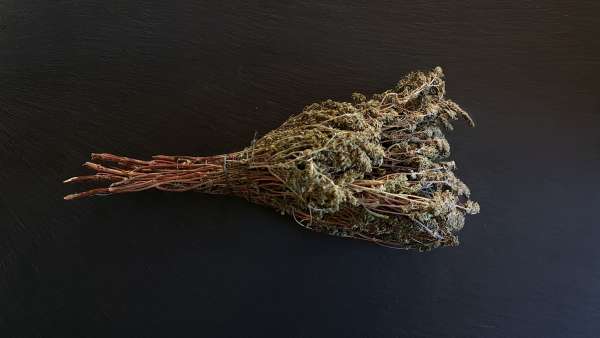Thyme
Thyme: Natural antibiotic used since ancient times for Healing and Vitality

In addition to the taste it brings to dishes, thyme is also recognized for its benefits to the body. As well as soothing coughs (acting like an antibiotic) and improving mood, thyme can also be used for gastrointestinal health and strengthening the immune system.
🌟 Discover how Thyme can improve your health naturally
Thyme is one of the most powerful traditional herbal remedies, with antibiotic, anti-inflammatory and antioxidant properties. Discover in this article how to use it to treat respiratory, digestive, immune and other conditions. Its curative effects have been known since ancient times and confirmed by modern medicine.
🌱 What is Thyme?
Thyme (Thymus vulgaris) is an aromatic Mediterranean herb with an intense flavor and pungent fragrance, used in both cooking and folk medicine. Rich in essential oils and antioxidants, thyme is considered a true natural antibiotic, protecting against infection and inflammation.
🧪 Nutritional and phytochemical composition of thyme
Thyme contains a variety of active compounds that give it its healing properties:
- Thymol - powerful antiseptic and antifungal
- Carvacrol - antibacterial effect
- Vitamin C - antioxidant and immunostimulant
- Vitamin A - essential for skin and vision
- Calcium, iron, magnesium, zinc - important minerals for bone and immune system
- Flavonoids - antioxidant effects
Nutritional values per 100g dried thyme:
- Calories: ~276 kcal
- Protein: 9.1 g
- Fat: 7,4 g
- Carbohydrates: 63 g
- Fiber: 37 g
- Calcium: 1890 mg
- Iron: 124 mg
- Magnesium: 220 mg
- Vitamin C: 50 mg
- Vitamin A: 4750 IU
💚 Thyme Health Benefits
- Natural antibiotic - fights bacteria and fungi (including Candida)
- Respiratory expectorant and antiseptic - useful in coughs, bronchitis, sinusitis
- Powerful digestive - reduces bloating, colic and abdominal spasms
- Antioxidant - protects cells from oxidative stress
- Boost immunity - with vitamin C and flavonoids
- Nervous calming - reduces anxiety and improves sleep
- Anti-inflammatory - effective in rheumatism and joint pain
- Helps fight intestinal parasites
⚠️ Contraindications and side effects of Thyme
- Contraindicated in pregnancy - may stimulate the uterus
- Allergies - may cause reactions in people sensitive to plants of the Lamiaceae family
- High doses - may cause nausea, headache or digestive problems
- Drug interactions - may influence the effects of anticoagulants
🧴 How to use Thyme in herbal therapies
- Thyme tea for colds and flu - 1 tsp dried thyme + 250 ml boiling water, infusion 10 min.
- Thyme inhalations - for nasal congestion and sinusitis, boil 2 tablespoons of herb in 1 liter of water
- Thyme essential oil - applied diluted on the chest, throat or used in aromatherapy
- Thyme syrup - cough soother (thyme, honey, lemon, steep for 7 days)
- Thyme tea gargle - for sore throat or mouth sores
- Tincture of thyme - digestive and general tonic (10 drops 3 times daily)
- Thyme poultices - for joint pain or infected wounds
🍳 Culinary uses of Thyme
Thyme is an aromatic herb prized in gastronomy for its intense flavor and warm, slightly spicy taste.
- It is added to stews, soups and soups for a deep flavor
- Ideal for red meat, game or fish marinades
- Used in traditional Romanian dishes such as sarmale or piftie
- Goes well with baked vegetables and baked potatoes
- In France it's part of bouquet garni - herb mix for soups and sauces
🔬 Recent scientific research on thyme
- Studies have shown that thymol and carvacrol have antibacterial effects comparable to some antibiotics
- Thyme extracts may inhibit tumor cell growth in colon and breast cancer (study published in Phytotherapy Research)
- Thyme has been tested as an antifungal agent against Candida albicans with promising results
- It is being studied in combination with other herbs for immunostimulant formulations
- Essential oil is being analyzed for its antiviral efficacy, including in seasonal flu
🤔 Did you know...? Curiosities about Thyme
- 🌿 Thyme was used by the Egyptians for embalming due to its antimicrobial effect
- 🛡️ Romans believed it gave soldiers courage before battle
- 🧼 In the Middle Ages, thyme was put under the pillow to ward off nightmares
- 🐝 Thyme attracts bees - excellent for medicinal honey
- 👃 Used in perfumery for its penetrating aroma
- 🌬️ Thyme oil is effective in treating asthma
- 🧠 Boosts memory and concentration
- 🧴 Thyme oil is an antiseptic used in hand hygiene
- 🍽️ Thyme is used in marinades to preserve meat
- 🧪 Has anticarcinogenic potential according to recent studies
- 💡 Used in Tibetan medicine to balance energy
- 🦷 Helps maintain oral health in natural toothpaste
- 🚫 Keeps insects and moths away
- 🦠 Kills E.coli and Salmonella bacteria
- ⚖️ Helps to lose weight through detoxifying and diuretic effect
- 🤧 Reduces symptoms of seasonal allergies
- 👣 Used in baths for tired feet and foot fungus
- 🍵 Taken after a meal prevents indigestion
- 🌿 Can be easily grown in pots even on the balcony
- 👨🍳 A key ingredient in many traditional Romanian recipes
Summary
Beneficial effects:
- anti-inflammatory;
- antibacterial;
- antioxidant;
- immunostimulating;
- digestive;
- nervous calming;
- expectorant;
- energizing;
- general tonic;
- detoxifying;
Side effects:
- nausea at high doses;
- abdominal pain;
- allergic reactions;
- interference with anticoagulants;
Contraindications:
- in pregnancy;
- allergy to Lamiaceae;
- children under 2 years (essential oil);
- thyroid problems (high doses);
Comments